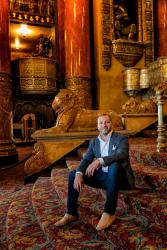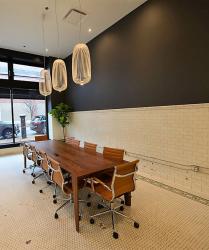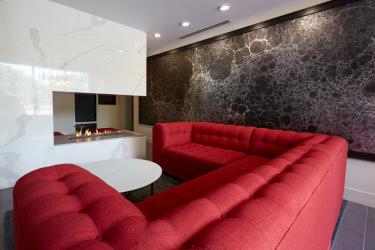SLHL: Please share an experience that was a major influence on your career decision.
Michael: During summers working in architecture firms and while in graduate school, I was fortunate enough to work on some wonderful projects. We would turn out great designs, but a recurring trend I saw was that the client/developers would almost always sacrifice the design for budget or their own personal tastes. I quickly realized that developers are the ones who ultimately get to decide what is built and how the public experiences the built environment. I decided that in order to be able to have the greatest influence possible in the architecture space, I needed to go into development as well.
SLHL: What has been the biggest compliment you've received in your career?
Michael: Besides this award? Actually, the greatest compliment is when someone tells me how much they enjoy the spaces that we have created for them. It’s easy to build any office or house or a restaurant, but when someone tells you that they truly feel good in that space, that the environment you have created inspires them, you feel accomplished.
SLHL: Who has been the biggest influencer in your career?
Michael: One of my architecture professors from my freshman year of college at Wash U told me something that I think about almost every day. While I always got great reviews on my work, when the semester was over he gave me a C+. I was incredibly confused and asked him why. He told me that my work was great at the beginning of the semester, and it was great at the end. He said that I had “good-enough syndrome” and never pushed myself to be any greater. I have never forgotten that lesson, and I try to ask myself with every project, and everything I do, is it just good enough or can I do better?
SLHL: What was a project or experience that was a turning point in your career?
Michael: I was serving as director of development for another local real estate development firm when the economic downturn hit in 2008. We had a $150 million plus portfolio of properties and when the economy tanked, many of our lenders asked for additional equity or, even worse, forced us to find alternate financing. With new development having all but stopped completely, I needed to figure out a new way to help the company grow. Having very little real estate finance experience, I quickly learned all I could about every type of commercial real estate loan and financing source out there. In a period of three years I became an expert of sorts in everything from Fannie Mae to commercial mortgage-backed securities (CMBS) loans. I financed over $100 million worth of properties, lowered debt service and positioned our company to be able to weather the recession. Today I use that knowledge and experience to help our clients find creative funding sources for their projects and guide them from start to finish through the process.
SLHL: Tell us a story from your childhood where your creative design genius kicked in.
Michael: I have known I wanted to be an architect since I was 6 years old. My great uncle was dean of the School of Architecture at Case Western Reserve and when we would visit, I would be captivated with his studio. He would let me draw, use his pens and encourage me to be creative. I was fortunate enough to attend a high school that offered an architecture class, which I took all four years. During my senior year I competed in a state-wide design competition for high school architecture students, the project being a transportation museum in downtown Houston. I won first place for my work. I knew then that this path was right for me, and I haven’t looked back since.
SLHL: What does it take to achieve a high level of success before 40?
Michael: First and foremost, incredibly hard work. Understand what you don’t know, and surround yourself with people you can learn from. No matter how much experience you have, someone else is doing it better, and we have to learn lessons from others in order to achieve a higher level of success. Constantly challenge yourself to improve upon what you think you are already doing well. Set goals, and stay accountable to them. Pick up a book, research the internet, find a mentor. Realize that it’s okay to make a mistake, because without those mistakes you don’t know how to do it better next time.









